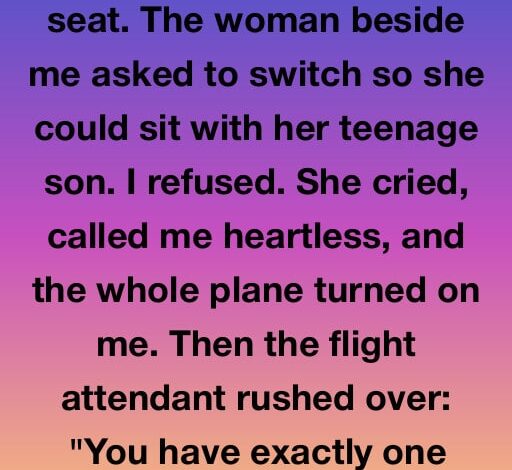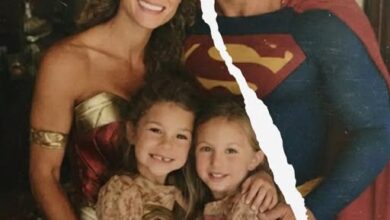
The Window Seat That Changed Everything
I paid extra for the window. A small thing, but for me it’s a lifeline. Clouds to count. Horizon to hold onto. Something to look at when the panic doesn’t listen to reason.
We’d barely settled when the woman next to me asked to switch so she could sit with her teenage son a few rows up. I told her I couldn’t. She blinked, then went glossy-eyed and whispered “Please.” When I said no again, she started to cry. A man across the aisle gave me a look. Someone behind us muttered, “People these days.”
The flight attendant arrived like a referee. “Ma’am, you have one minute to decide or we’ll have to escalate.”
“Escalate?” I said, dumbly.
She leaned in, voice tired. “We’re overbooked. A passenger won’t board without a window. Yours is the last one.”
So now it wasn’t just an awkward ask—it was leverage. The boy stood two rows ahead gripping a worn backpack, pretending to be invisible. His mother clutched a tissue like I’d personally ruined her life. The whole row waited for my moral awakening.
Here’s what no one asked: why I needed that seat.
Flying shreds me. Not butterflies—panic. Full-body, cold-palm, can’t-breathe panic. The window is my tool. My therapist calls it “visual grounding.” I call it survival.
“I’m sorry,” I said, trying to keep my voice even. “I really need this seat.”
She scoffed. The attendant pressed her lips together, nodded, and moved on. The boy sat with a stranger. His mom wouldn’t look at me.
We took off inside a soup of judgment.
Twenty minutes in, the plane hit real turbulence—rollercoaster drops, tin-can rattling. Gasps. Seatbelts creaked. My chest tightened. I glued my eyes to the glass and counted the layers of sky.
“You okay?” my seatmate asked.
“I’m fine,” I lied.
“You don’t look fine.”
We finally made eye contact. Hers were swollen. Mine were wild.
“I have really bad anxiety,” I said. “That’s why I couldn’t switch. It wasn’t about you.”
Something eased in her face. “My son hates flying. He just wants me close.” She stared past me. “His dad died last month. We’re going to stay with his parents for a while. I thought a change would help. Nothing really helps.”
“I’m sorry,” I said, and meant it.
“I shouldn’t have snapped,” she whispered. “I’m just… tired.”
“I get that.”
We didn’t talk much after. When we landed, she stood, shouldered her bag, and managed a small, shaky smile. “Thanks for listening.”
I nodded. That felt like the end.
Three days later, my sister—she’s a social worker in a small town—called. “Random question. Did you fly out of JFK on Sunday?”
“Yeah… why?”
“There’s a woman here for resources. Miranda. Teen son. Husband died. She said she misjudged someone on a plane and realized not everyone is what they seem.” My sister paused. “Seat drama ring a bell?”
I stared at my kitchen wall. “She said that?”
“She did.”
A week after that, an envelope showed up. No return address. Inside: a note in uneven, careful handwriting.
“You helped more than you knew. Sometimes just being seen—even silently—matters. Thank you for holding your ground and for being human. —M.”
Taped to the note was a tiny silver cloud charm. I put it on my key ring.
Months passed. I touched the charm sometimes without thinking, the way you check a scar you’ve made peace with.
One cold afternoon in November, I ducked into a bookstore after therapy. I was leafing through a poetry collection when someone said my name.
It was the boy. Taller now. Hair longer. Hoodie half-zipped like he liked a quick exit.
“You’re the window-seat lady,” he said, half-grinning.
“Guilty.”
He shifted, suddenly shy. “I wanted to say thanks. I was… not okay then.”
“I remember.”
“My mom said you reminded her people have their own stuff going on. I started drawing again.” He held out a sketchbook. On the page: an airplane window, clouds layered like soft armor. In the corner, a tiny silver charm.
“May I?” I asked.
He nodded. I took a picture. He didn’t ask why.
We talked for a few minutes. He’d gotten into a local art program. “My counselor said making peace with things is good. So—hi.”
“Hi,” I said, and felt something inside me click quietly into place.
That night I wrote about it online. Not to be vindicated—just to lay the whole messy thing down. I ended with this: sometimes the kindest thing you can do is honor your own boundary without humiliating anyone. Your “no” can still carry care.
The post blew up. Stories poured in. A mom who gave up her seat and missed a connection. A man who didn’t switch and spent two hours crying with a stranger fresh from a funeral. People choosing, fumbling, trying, failing, mending.
We don’t always get to explain ourselves in the moment. You might look selfish from the cheap seats. But life has layers. Grace often shows up late.
I’m glad I kept my window. Not because I “won.” Because I learned that staying put—with gentleness—can open more doors than caving for approval. It took a storm, a grieving mother, and a quiet kid to teach me that.
So here’s to the ones called heartless for saying no, selfish for needing what keeps them steady, cold for not performing generosity on cue. Sometimes the window seat isn’t just a seat. It’s a lifeline. A choice. A beginning.
If this nudged something in you, pass it on. Someone out there needs to know their boundary can still be kind.




